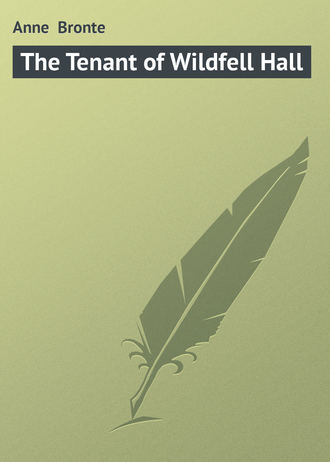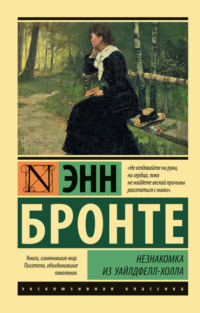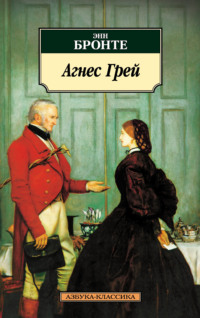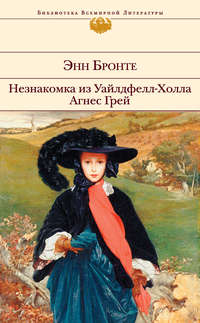
The Tenant of Wildfell Hall
Have I no faith in God? I try to look to Him and raise my heart to heaven, but it will cleave to the dust. I can only say, 'He hath hedged me about, that I cannot get out: He hath made my chain heavy. He hath filled me with bitterness – He hath made me drunken with wormwood.' I forget to add, 'But though He cause grief, yet will He have compassion according to the multitude of His mercies. For He doth not afflict willingly nor grieve the children of men.' I ought to think of this; and if there be nothing but sorrow for me in this world, what is the longest life of misery to a whole eternity of peace? And for my little Arthur – has he no friend but me? Who was it said, 'It is not the will of your Father which is in heaven that one of these little ones should perish?'
Chapter XLI
March 20th. – Having now got rid of Mr. Huntingdon for a season, my spirits begin to revive. He left me early in February; and the moment he was gone, I breathed again, and felt my vital energy return; not with the hope of escape – he has taken care to leave me no visible chance of that – but with a determination to make the best of existing circumstances. Here was Arthur left to me at last; and rousing from my despondent apathy, I exerted all my powers to eradicate the weeds that had been fostered in his infant mind, and sow again the good seed they had rendered unproductive. Thank heaven, it is not a barren or a stony soil; if weeds spring fast there, so do better plants. His apprehensions are more quick, his heart more overflowing with affection than ever his father's could have been, and it is no hopeless task to bend him to obedience and win him to love and know his own true friend, as long as there is no one to counteract my efforts.
I had much trouble at first in breaking him of those evil habits his father had taught him to acquire, but already that difficulty is nearly vanquished now: bad language seldom defiles his mouth, and I have succeeded in giving him an absolute disgust for all intoxicating liquors, which I hope not even his father or his father's friends will be able to overcome. He was inordinately fond of them for so young a creature, and, remembering my unfortunate father as well as his, I dreaded the consequences of such a taste. But if I had stinted him, in his usual quantity of wine, or forbidden him to taste it altogether, that would only have increased his partiality for it, and made him regard it as a greater treat than ever. I therefore gave him quite as much as his father was accustomed to allow him; as much, indeed, as he desired to have – but into every glass I surreptitiously introduced a small quantity of tartar-emetic, just enough to produce inevitable nausea and depression without positive sickness. Finding such disagreeable consequences invariably to result from this indulgence, he soon grew weary of it, but the more he shrank from the daily treat the more I pressed it upon him, till his reluctance was strengthened to perfect abhorrence. When he was thoroughly disgusted with every kind of wine, I allowed him, at his own request, to try brandy-and-water, and then gin-and-water, for the little toper was familiar with them all, and I was determined that all should be equally hateful to him. This I have now effected; and since he declares that the taste, the smell, the sight of any one of them is sufficient to make him sick, I have given up teasing him about them, except now and then as objects of terror in cases of misbehaviour. 'Arthur, if you're not a good boy I shall give you a glass of wine,' or 'Now, Arthur, if you say that again you shall have some brandy-and-water,' is as good as any other threat; and once or twice, when he was sick, I have obliged the poor child to swallow a little wine-and-water without the tartar-emetic, by way of medicine; and this practice I intend to continue for some time to come; not that I think it of any real service in a physical sense, but because I am determined to enlist all the powers of association in my service; I wish this aversion to be so deeply grounded in his nature that nothing in after-life may be able to overcome it.
Thus, I flatter myself, I shall secure him from this one vice; and for the rest, if on his father's return I find reason to apprehend that my good lessons will be all destroyed – if Mr. Huntingdon commence again the game of teaching the child to hate and despise his mother, and emulate his father's wickedness – I will yet deliver my son from his hands. I have devised another scheme that might be resorted to in such a case; and if I could but obtain my brother's consent and assistance, I should not doubt of its success. The old hall where he and I were born, and where our mother died, is not now inhabited, nor yet quite sunk into decay, as I believe. Now, if I could persuade him to have one or two rooms made habitable, and to let them to me as a stranger, I might live there, with my child, under an assumed name, and still support myself by my favourite art. He should lend me the money to begin with, and I would pay him back, and live in lowly independence and strict seclusion, for the house stands in a lonely place, and the neighbourhood is thinly inhabited, and he himself should negotiate the sale of my pictures for me. I have arranged the whole plan in my head: and all I want is to persuade Frederick to be of the same mind as myself. He is coming to see me soon, and then I will make the proposal to him, having first enlightened him upon my circumstances sufficiently to excuse the project.
Already, I believe, he knows much more of my situation than I have told him. I can tell this by the air of tender sadness pervading his letters; and by the fact of his so seldom mentioning my husband, and generally evincing a kind of covert bitterness when he does refer to him; as well as by the circumstance of his never coming to see me when Mr. Huntingdon is at home. But he has never openly expressed any disapprobation of him or sympathy for me; he has never asked any questions, or said anything to invite my confidence. Had he done so, I should probably have had but few concealments from him. Perhaps he feels hurt at my reserve. He is a strange being; I wish we knew each other better. He used to spend a month at Staningley every year, before I was married; but, since our father's death, I have only seen him once, when he came for a few days while Mr. Huntingdon was away. He shall stay many days this time, and there shall be more candour and cordiality between us than ever there was before, since our early childhood. My heart clings to him more than ever; and my soul is sick of solitude.
April 16th. – He is come and gone. He would not stay above a fortnight. The time passed quickly, but very, very happily, and it has done me good. I must have a bad disposition, for my misfortunes have soured and embittered me exceedingly: I was beginning insensibly to cherish very unamiable feelings against my fellow-mortals, the male part of them especially; but it is a comfort to see there is at least one among them worthy to be trusted and esteemed; and doubtless there are more, though I have never known them, unless I except poor Lord Lowborough, and he was bad enough in his day. But what would Frederick have been, if he had lived in the world, and mingled from his childhood with such men as these of my acquaintance? and what will Arthur be, with all his natural sweetness of disposition, if I do not save him from that world and those companions? I mentioned my fears to Frederick, and introduced the subject of my plan of rescue on the evening after his arrival, when I presented my little son to his uncle.
'He is like you, Frederick,' said I, 'in some of his moods: I sometimes think he resembles you more than his father; and I am glad of it.'
'You flatter me, Helen,' replied he, stroking the child's soft, wavy locks.
'No, you will think it no compliment when I tell you I would rather have him to resemble Benson than his father.'
He slightly elevated his eyebrows, but said nothing.
'Do you know what sort of man Mr. Huntingdon is?' said I.
'I think I have an idea.'
'Have you so clear an idea that you can hear, without surprise or disapproval, that I meditate escaping with that child to some secret asylum, where we can live in peace, and never see him again?'
'Is it really so?'
'If you have not,' continued I, 'I'll tell you something more about him'; and I gave a sketch of his general conduct, and a more particular account of his behaviour with regard to his child, and explained my apprehensions on the latter's account, and my determination to deliver him from his father's influence.
Frederick was exceedingly indignant against Mr. Huntingdon, and very much grieved for me; but still he looked upon my project as wild and impracticable. He deemed my fears for Arthur disproportioned to the circumstances, and opposed so many objections to my plan, and devised so many milder methods for ameliorating my condition, that I was obliged to enter into further details to convince him that my husband was utterly incorrigible, and that nothing could persuade him to give up his son, whatever became of me, he being as fully determined the child should not leave him, as I was not to leave the child; and that, in fact, nothing would answer but this, unless I fled the country, as I had intended before. To obviate that, he at length consented to have one wing of the old hall put into a habitable condition, as a place of refuge against a time of need; but hoped I would not take advantage of it unless circumstances should render it really necessary, which I was ready enough to promise: for though, for my own sake, such a hermitage appears like paradise itself, compared with my present situation, yet for my friends' sakes, for Milicent and Esther, my sisters in heart and affection, for the poor tenants of Grassdale, and, above all, for my aunt, I will stay if I possibly can.
July 29th. – Mrs. Hargrave and her daughter are come back from London. Esther is full of her first season in town; but she is still heart-whole and unengaged. Her mother sought out an excellent match for her, and even brought the gentleman to lay his heart and fortune at her feet; but Esther had the audacity to refuse the noble gifts. He was a man of good family and large possessions, but the naughty girl maintained he was old as Adam, ugly as sin, and hateful as – one who shall be nameless.
'But, indeed, I had a hard time of it,' said she: 'mamma was very greatly disappointed at the failure of her darling project, and very, very angry at my obstinate resistance to her will, and is so still; but I can't help it. And Walter, too, is so seriously displeased at my perversity and absurd caprice, as he calls it, that I fear he will never forgive me – I did not think he could be so unkind as he has lately shown himself. But Milicent begged me not to yield, and I'm sure, Mrs. Huntingdon, if you had seen the man they wanted to palm upon me, you would have advised me not to take him too.'
'I should have done so whether I had seen him or not,' said I; 'it is enough that you dislike him.'
'I knew you would say so; though mamma affirmed you would be quite shocked at my undutiful conduct. You can't imagine how she lectures me: I am disobedient and ungrateful; I am thwarting her wishes, wronging my brother, and making myself a burden on her hands. I sometimes fear she'll overcome me after all. I have a strong will, but so has she, and when she says such bitter things, it provokes me to such a pass that I feel inclined to do as she bids me, and then break my heart and say, "There, mamma, it's all your fault!"'
'Pray don't!' said I. 'Obedience from such a motive would be positive wickedness, and certain to bring the punishment it deserves. Stand firm, and your mamma will soon relinquish her persecution; and the gentleman himself will cease to pester you with his addresses if he finds them steadily rejected.'
'Oh, no! mamma will weary all about her before she tires herself with her exertions; and as for Mr. Oldfield, she has given him to understand that I have refused his offer, not from any dislike of his person, but merely because I am giddy and young, and cannot at present reconcile myself to the thoughts of marriage under any circumstances: but by next season, she has no doubt, I shall have more sense, and hopes my girlish fancies will be worn away. So she has brought me home, to school me into a proper sense of my duty, against the time comes round again. Indeed, I believe she will not put herself to the expense of taking me up to London again, unless I surrender: she cannot afford to take me to town for pleasure and nonsense, she says, and it is not every rich gentleman that will consent to take me without a fortune, whatever exalted ideas I may have of my own attractions.'
'Well, Esther, I pity you; but still, I repeat, stand firm. You might as well sell yourself to slavery at once, as marry a man you dislike. If your mother and brother are unkind to you, you may leave them, but remember you are bound to your husband for life.'
'But I cannot leave them unless I get married, and I cannot get married if nobody sees me. I saw one or two gentlemen in London that I might have liked, but they were younger sons, and mamma would not let me get to know them – one especially, who I believe rather liked me – but she threw every possible obstacle in the way of our better acquaintance. Wasn't it provoking?'
'I have no doubt you would feel it so, but it is possible that if you married him, you might have more reason to regret it hereafter than if you married Mr. Oldfield. When I tell you not to marry without love, I do not advise you to marry for love alone: there are many, many other things to be considered. Keep both heart and hand in your own possession, till you see good reason to part with them; and if such an occasion should never present itself, comfort your mind with this reflection, that though in single life your joys may not be very many, your sorrows, at least, will not be more than you can bear. Marriage may change your circumstances for the better, but, in my private opinion, it is far more likely to produce a contrary result.'
'So thinks Milicent; but allow me to say I think otherwise. If I thought myself doomed to old-maidenhood, I should cease to value my life. The thoughts of living on, year after year, at the Grove – a hanger-on upon mamma and Walter, a mere cumberer of the ground (now that I know in what light they would regard it), is perfectly intolerable; I would rather run away with the butler.'
'Your circumstances are peculiar, I allow; but have patience, love; do nothing rashly. Remember you are not yet nineteen, and many years are yet to pass before any one can set you down as an old maid: you cannot tell what Providence may have in store for you. And meantime, remember you have a right to the protection and support of your mother and brother, however they may seem to grudge it.'
'You are so grave, Mrs. Huntingdon,' said Esther, after a pause. 'When Milicent uttered the same discouraging sentiments concerning marriage, I asked if she was happy: she said she was; but I only half believed her; and now I must put the same question to you.'
'It is a very impertinent question,' laughed I, 'from a young girl to a married woman so many years her senior, and I shall not answer it.'
'Pardon me, dear madam,' said she, laughingly throwing herself into my arms, and kissing me with playful affection; but I felt a tear on my neck, as she dropped her head on my bosom and continued, with an odd mixture of sadness and levity, timidity and audacity, – 'I know you are not so happy as I mean to be, for you spend half your life alone at Grassdale, while Mr. Huntingdon goes about enjoying himself where and how he pleases. I shall expect my husband to have no pleasures but what he shares with me; and if his greatest pleasure of all is not the enjoyment of my company, why, it will be the worse for him, that's all.'
'If such are your expectations of matrimony, Esther, you must, indeed, be careful whom you marry – or rather, you must avoid it altogether.'
Chapter XLII
September 1st. – No Mr. Huntingdon yet. Perhaps he will stay among his friends till Christmas; and then, next spring, he will be off again. If he continue this plan, I shall be able to stay at Grassdale well enough – that is, I shall be able to stay, and that is enough; even an occasional bevy of friends at the shooting season may be borne, if Arthur get so firmly attached to me, so well established in good sense and principles before they come that I shall be able, by reason and affection, to keep him pure from their contaminations. Vain hope, I fear! but still, till such a time of trial comes I will forbear to think of my quiet asylum in the beloved old hall.
Mr. and Mrs. Hattersley have been staying at the Grove a fortnight: and as Mr. Hargrave is still absent, and the weather was remarkably fine, I never passed a day without seeing my two friends, Milicent and Esther, either there or here. On one occasion, when Mr. Hattersley had driven them over to Grassdale in the phaeton, with little Helen and Ralph, and we were all enjoying ourselves in the garden – I had a few minutes' conversation with that gentleman, while the ladies were amusing themselves with the children.
'Do you want to hear anything of your husband, Mrs. Huntingdon?' said he.
'No, unless you can tell me when to expect him home.'
'I can't. – You don't want him, do you?' said he, with a broad grin.
'No.'
'Well, I think you're better without him, sure enough – for my part, I'm downright weary of him. I told him I'd leave him if he didn't mend his manners, and he wouldn't; so I left him. You see, I'm a better man than you think me; and, what's more, I have serious thoughts of washing my hands of him entirely, and the whole set of 'em, and comporting myself from this day forward with all decency and sobriety, as a Christian and the father of a family should do. What do you think of that?'
'It is a resolution you ought to have formed long ago.'
'Well, I'm not thirty yet; it isn't too late, is it?'
'No; it is never too late to reform, as long as you have the sense to desire it, and the strength to execute your purpose.'
'Well, to tell you the truth, I've thought of it often and often before; but he's such devilish good company, is Huntingdon, after all. You can't imagine what a jovial good fellow he is when he's not fairly drunk, only just primed or half-seas-over. We all have a bit of a liking for him at the bottom of our hearts, though we can't respect him.'
'But should you wish yourself to be like him?'
'No, I'd rather be like myself, bad as I am.'
'You can't continue as bad as you are without getting worse and more brutalised every day, and therefore more like him.'
I could not help smiling at the comical, half-angry, half– confounded look he put on at this rather unusual mode of address.
'Never mind my plain speaking,' said I; 'it is from the best of motives. But tell me, should you wish your sons to be like Mr. Huntingdon – or even like yourself?'
'Hang it! no.'
'Should you wish your daughter to despise you – or, at least, to feel no vestige of respect for you, and no affection but what is mingled with the bitterest regret?'
'Oh, no! I couldn't stand that.'
'And, finally, should you wish your wife to be ready to sink into the earth when she hears you mentioned; and to loathe the very sound of your voice, and shudder at your approach?'
'She never will; she likes me all the same, whatever I do.'
'Impossible, Mr. Hattersley! you mistake her quiet submission for affection.'
'Fire and fury – '
'Now don't burst into a tempest at that. I don't mean to say she does not love you – she does, I know, a great deal better than you deserve; but I am quite sure, that if you behave better, she will love you more, and if you behave worse, she will love you less and less, till all is lost in fear, aversion, and bitterness of soul, if not in secret hatred and contempt. But, dropping the subject of affection, should you wish to be the tyrant of her life – to take away all the sunshine from her existence, and make her thoroughly miserable?'
'Of course not; and I don't, and I'm not going to.'
'You have done more towards it than you suppose.'
'Pooh, pooh! she's not the susceptible, anxious, worriting creature you imagine: she's a little meek, peaceable, affectionate body; apt to be rather sulky at times, but quiet and cool in the main, and ready to take things as they come.'
'Think of what she was five years ago, when you married her, and what she is now.'
'I know she was a little plump lassie then, with a pretty pink and white face: now she's a poor little bit of a creature, fading and melting away like a snow-wreath. But hang it! – that's not my fault.'
'What is the cause of it then? Not years, for she's only five-and– twenty.'
'It's her own delicate health, and confound it, madam! what would you make of me? – and the children, to be sure, that worry her to death between them.'
'No, Mr. Hattersley, the children give her more pleasure than pain: they are fine, well-dispositioned children – '
'I know they are – bless them!'
'Then why lay the blame on them? – I'll tell you what it is: it's silent fretting and constant anxiety on your account, mingled, I suspect, with something of bodily fear on her own. When you behave well, she can only rejoice with trembling; she has no security, no confidence in your judgment or principles; but is continually dreading the close of such short-lived felicity; when you behave ill, her causes of terror and misery are more than any one can tell but herself. In patient endurance of evil, she forgets it is our duty to admonish our neighbours of their transgressions. Since you will mistake her silence for indifference, come with me, and I'll show you one or two of her letters – no breach of confidence, I hope, since you are her other half.'
He followed me into the library. I sought out and put into his hands two of Milicent's letters: one dated from London, and written during one of his wildest seasons of reckless dissipation; the other in the country, during a lucid interval. The former was full of trouble and anguish; not accusing him, but deeply regretting his connection with his profligate companions, abusing Mr. Grimsby and others, insinuating bitter things against Mr. Huntingdon, and most ingeniously throwing the blame of her husband's misconduct on to other men's shoulders. The latter was full of hope and joy, yet with a trembling consciousness that this happiness would not last; praising his goodness to the skies, but with an evident, though but half-expressed wish, that it were based on a surer foundation than the natural impulses of the heart, and a half-prophetic dread of the fall of that house so founded on the sand, – which fall had shortly after taken place, as Hattersley must have been conscious while he read.
Almost at the commencement of the first letter I had the unexpected pleasure of seeing him blush; but he immediately turned his back to me, and finished the perusal at the window. At the second, I saw him, once or twice, raise his hand, and hurriedly pass it across his face. Could it be to dash away a tear? When he had done, there was an interval spent in clearing his throat and staring out of the window, and then, after whistling a few bars of a favourite air, he turned round, gave me back the letters, and silently shook me by the hand.
'I've been a cursed rascal, God knows,' said he, as he gave it a hearty squeeze, 'but you see if I don't make amends for it – d-n me if I don't!'
'Don't curse yourself, Mr. Hattersley; if God had heard half your invocations of that kind, you would have been in hell long before now – and you cannot make amends for the past by doing your duty for the future, inasmuch as your duty is only what you owe to your Maker, and you cannot do more than fulfil it: another must make amends for your past delinquencies. If you intend to reform, invoke God's blessing, His mercy, and His aid; not His curse.'
'God help me, then – for I'm sure I need it. Where's Milicent?'
'She's there, just coming in with her sister.'
He stepped out at the glass door, and went to meet them. I followed at a little distance. Somewhat to his wife's astonishment, he lifted her off from the ground, and saluted her with a hearty kiss and a strong embrace; then placing his two hands on her shoulders, he gave her, I suppose, a sketch of the great things he meant to do, for she suddenly threw her arms round him, and burst into tears, exclaiming, – 'Do, do, Ralph – we shall be so happy! How very, very good you are!'








